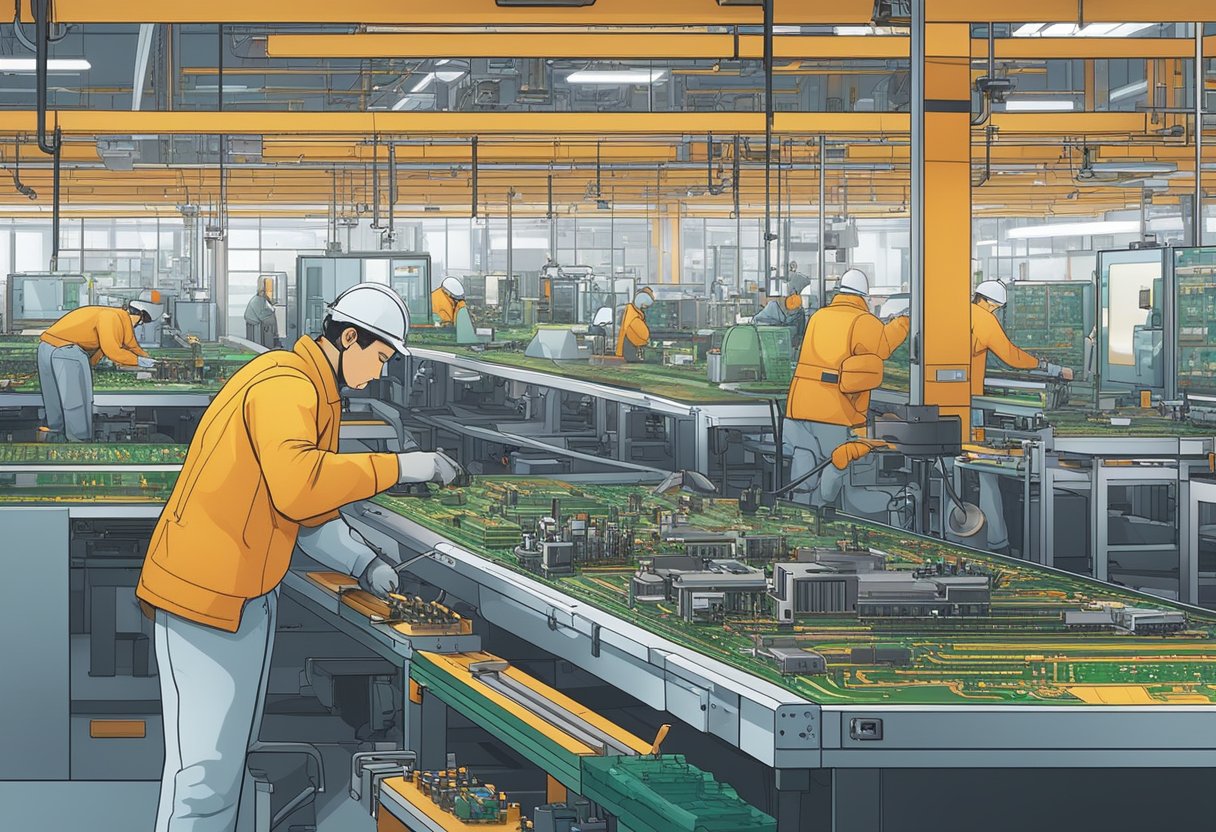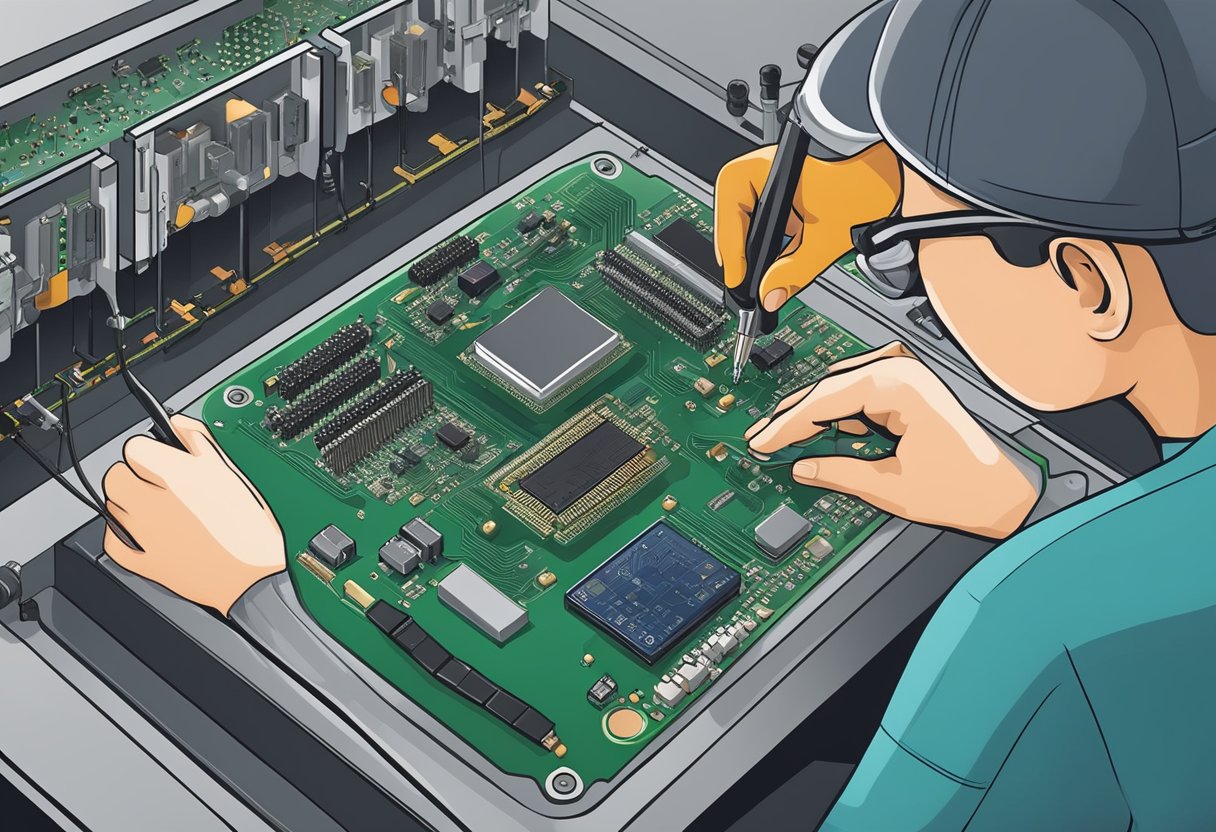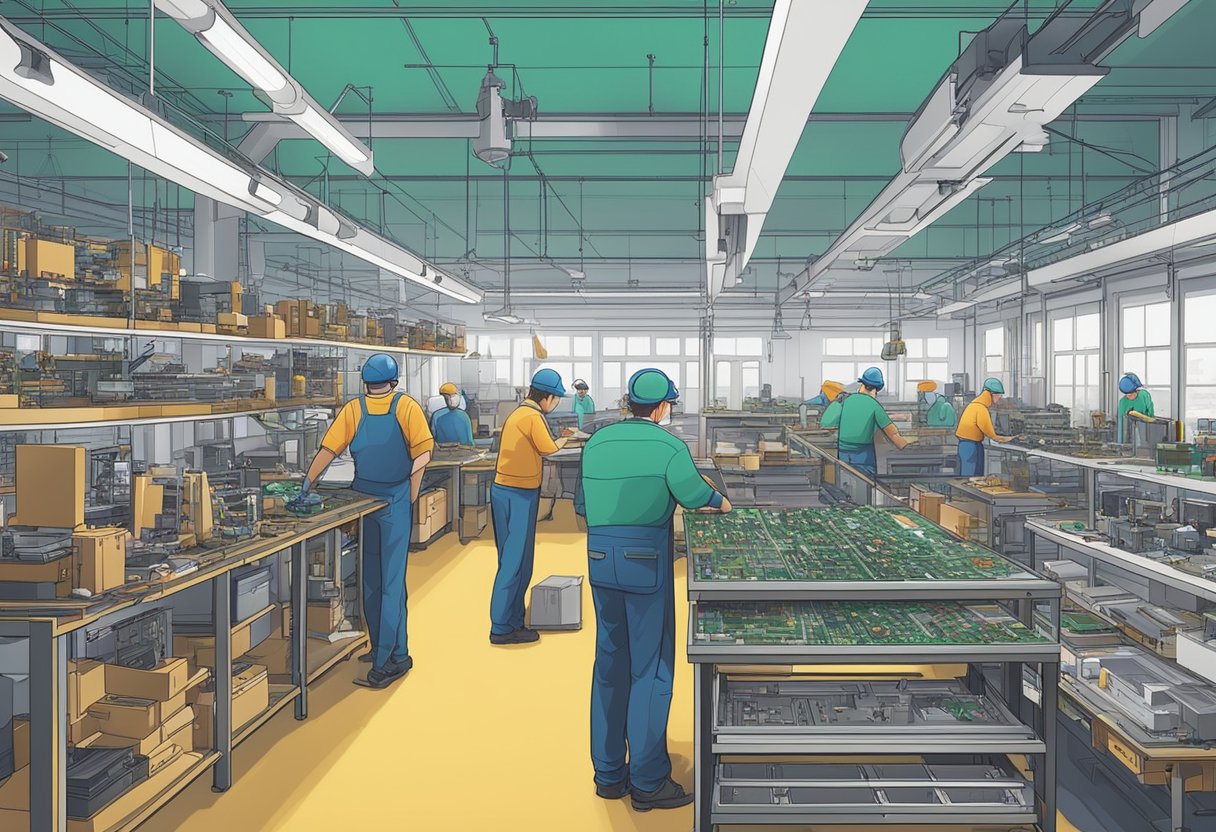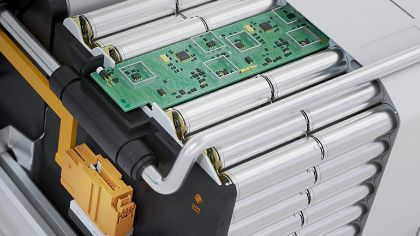PCB Assembly Jobs Near Me: How to Find the Best Opportunities
PCB assembly jobs are becoming increasingly popular as the demand for electronic devices continues to rise. Many companies are seeking skilled workers to assemble printed circuit boards, which are essential components of electronic devices. If you are looking for a job in this field, you may be wondering where to start your search.

One option is to search for PCB assembly jobs near you. This can be a convenient way to find work in your local area, and it may also offer opportunities to work with companies that you are already familiar with. There are a variety of job boards and websites that can help you find these types of jobs, and many companies also advertise their openings on their own websites.
However, it is important to keep in mind that the availability of PCB assembly jobs may vary depending on your location. Some areas may have a higher demand for these types of workers than others, and some companies may be more likely to hire remote workers or outsource their assembly work to other locations. It may be helpful to research the job market in your area and explore different options for finding employment in this field.
Understanding PCB Assembly Jobs

PCB assembly jobs involve the process of assembling electronic components onto a printed circuit board (PCB). PCBs are used in a wide range of electronic devices, including computers, smartphones, and medical equipment. This process requires skilled workers with a deep understanding of electronic components and how they are assembled.
Roles and Responsibilities
There are several roles involved in PCB assembly jobs, each with their own responsibilities. These roles may include:
- Assembler: Responsible for assembling electronic components onto the PCB according to specifications.
- Solderer: Responsible for soldering electronic components onto the PCB using a soldering iron or other equipment.
- Quality Control Inspector: Responsible for inspecting finished PCBs to ensure they meet quality standards and specifications.
- Supervisor: Responsible for overseeing the entire PCB assembly process and ensuring that everything runs smoothly.
Required Skills and Qualifications
To work in PCB assembly, individuals must possess a variety of skills and qualifications. These may include:
- Technical Knowledge: A deep understanding of electronic components and how they are assembled onto a PCB.
- Attention to Detail: A keen eye for detail is essential to ensure that components are assembled correctly and that finished PCBs meet quality standards.
- Manual Dexterity: The ability to work with small components and tools is essential in PCB assembly.
- Good Communication Skills: Effective communication is important in PCB assembly to ensure that everyone involved in the process is on the same page.
- Certification: Many employers require certification in PCB assembly or related fields.
Overall, PCB assembly jobs require skilled workers with a deep understanding of electronic components and the ability to assemble them onto a PCB with precision and accuracy. Those interested in pursuing a career in PCB assembly should possess the necessary skills and qualifications and be prepared to work in a fast-paced, detail-oriented environment.
Local PCB Assembly Market Overview

Industry Demand
The demand for PCB assembly jobs in the local market has been steadily increasing over the past few years. This is due to the rise in demand for electronic products such as smartphones, computers, and other smart devices. With the increase in demand, there has been a surge in the number of companies that require PCB assembly services. This has led to a rise in the number of job openings in the industry.
Key Employers
There are several key employers in the local PCB assembly market. Some of the top employers include ABC Electronics, XYZ Manufacturing, and DEF Technologies. These companies are known for their high-quality products and services, which has helped them establish a strong reputation in the industry. They offer a range of job opportunities for individuals with different skill sets, from entry-level positions to more advanced roles.
To attract and retain top talent, these companies offer competitive salaries and benefits packages. They also provide opportunities for career growth and development, which makes them an attractive option for individuals looking to build a career in the PCB assembly industry.
Overall, the local PCB assembly market is thriving, with a growing demand for skilled professionals and a range of job opportunities available. As the demand for electronic products continues to rise, the industry is expected to continue growing, providing more job opportunities for individuals with the right skills and experience.
Searching for PCB Assembly Jobs

Finding a job in PCB assembly can be a daunting task, especially if you are not familiar with the industry and the available opportunities. However, with the right resources and strategies, you can increase your chances of finding a suitable position that matches your skills and preferences. Here are some avenues to explore:
Job Boards
One of the most common ways to search for PCB assembly jobs is through online job boards. These websites allow you to browse and apply for openings from various companies and locations. Some popular job boards for electronics and manufacturing include Indeed, Monster, Glassdoor, and ZipRecruiter. You can use keywords such as “PCB assembly,” “SMT assembly,” “electronics technician,” or “manufacturing operator” to narrow down your search. You can also filter by location, experience level, salary, and other criteria. Make sure to read the job descriptions carefully and tailor your resume and cover letter to each application.
Company Websites
Another way to find PCB assembly jobs is by visiting the websites of specific companies that specialize in electronics manufacturing or assembly. Many companies post their job openings on their career pages or social media accounts. You can also send a speculative application or inquire about any upcoming positions that match your profile. Some notable companies in the PCB assembly industry include Jabil, Sanmina, Flex, Celestica, and Benchmark Electronics. Make sure to research the company’s background, products, and values before applying to demonstrate your interest and fit.
Recruitment Agencies
If you prefer a more personalized approach to your job search, you can consider working with a recruitment agency that specializes in electronics or manufacturing. These agencies can help you identify suitable job opportunities, improve your resume and interview skills, and provide feedback and support throughout the hiring process. Some reputable recruitment agencies in the PCB assembly field include Kelly Services, Adecco, Manpower, and Randstad. Make sure to check their reputation, fees, and services before signing up, and communicate your expectations and requirements clearly.
By using a combination of these resources, you can increase your visibility and chances of landing a PCB assembly job that matches your goals and strengths. Keep in mind that the job market may fluctuate, and you may need to be patient and persistent in your search. However, with the right mindset and tools, you can succeed in your career as a PCB assembler.
Applying for PCB Assembly Jobs
Resume and Cover Letter Tips
When applying for PCB assembly jobs, it is crucial to have a well-written and informative resume and cover letter. Your resume should highlight your relevant experience, skills, and education. It should be easy to read and formatted in a clear and concise manner. Consider using bullet points to make your qualifications stand out.
Your cover letter should introduce yourself and explain why you are interested in the position. It should also demonstrate how your skills and experience align with the job requirements. Make sure to tailor your cover letter to each specific job you apply for.
Interview Preparation
Preparing for an interview is essential to make a good impression on potential employers. Research the company and the position you are applying for to gain a better understanding of the job responsibilities and company culture.
Practice answering common interview questions and prepare examples of your relevant experience and skills. Dress professionally and arrive early to the interview to show your enthusiasm and punctuality.
During the interview, make sure to listen carefully to the interviewer’s questions and answer them clearly and confidently. Don’t be afraid to ask questions about the job or company to show your interest and engagement.
Overall, by following these tips and preparing thoroughly, you can increase your chances of landing a PCB assembly job near you.
Career Advancement in PCB Assembly
PCB assembly is a growing field with plenty of opportunities for career advancement. With the right training and certifications, individuals can move up the ladder and take on more challenging roles.
Certifications and Training
One way to advance in the field of PCB assembly is to obtain relevant certifications and training. There are several organizations that offer certifications in PCB assembly, including the IPC (Association Connecting Electronics Industries) and the SMTA (Surface Mount Technology Association).
Certifications such as the IPC-A-610 and IPC J-STD-001 demonstrate a high level of knowledge and skill in the industry. These certifications cover topics such as soldering, component placement, and inspection standards.
In addition to certifications, individuals can also pursue training programs to further their knowledge and skills. Many companies offer on-the-job training, while others may offer formal training programs through technical schools or community colleges.
Networking
Networking is another important aspect of career advancement in PCB assembly. Joining industry organizations such as the IPC or SMTA can provide opportunities to connect with other professionals in the field.
Attending industry conferences and trade shows can also be beneficial for networking. These events offer the chance to meet with industry leaders, learn about new technologies, and stay up-to-date on industry trends.
Overall, obtaining certifications and training and networking with other professionals can help individuals advance their careers in PCB assembly. With dedication and hard work, individuals can take on more challenging roles and achieve their career goals in this growing field.
Understanding Salary and Benefits
Compensation Structures
PCB assembly jobs near you may offer various compensation structures to their employees. The most common structures include hourly wages, salaries, and performance-based pay.
Hourly wages are paid based on the number of hours worked by an employee. This structure is common for entry-level positions or jobs that require a specific skill set. On the other hand, salaried employees are paid a fixed amount regardless of the number of hours worked. This structure is common for managerial or supervisory positions.
Performance-based pay is a structure where an employee’s salary or bonus is tied to their performance. This structure is common in sales or commission-based jobs.
Negotiating Job Offers
Negotiating job offers is an important part of the hiring process. It is essential to understand the salary and benefits package offered by the employer before accepting the job offer.
When negotiating job offers, it is important to research the industry standards and the cost of living in the area. This will help the employee determine a reasonable salary expectation. Additionally, the employee should consider the benefits package offered by the employer, such as health insurance, retirement plans, and paid time off.
It is also important to approach negotiations with a positive attitude and willingness to compromise. The employee should be clear about their expectations and open to discussing options with the employer.
Overall, understanding the compensation structures and negotiating job offers can help employees secure a fair salary and benefits package for their PCB assembly jobs near them.
Workplace Environment
Health and Safety Regulations
PCB assembly jobs require a workplace environment that is safe and secure. Companies that offer such jobs strictly adhere to health and safety regulations to ensure the well-being of their employees. These regulations include the use of protective gear such as gloves, goggles, and masks to prevent exposure to hazardous chemicals during the assembly process. The companies also enforce strict guidelines on the handling and disposal of chemicals to prevent environmental pollution.
Team Dynamics
The workplace environment for PCB assembly jobs is often collaborative and team-oriented. Employees work together to ensure the smooth running of the assembly process. This includes working in shifts to ensure that production runs 24/7. Team members are often cross-trained to ensure flexibility in the production process, and to cover for each other in case of absence. This ensures that the production process is not disrupted, and deadlines are met.
Overall, the workplace environment for PCB assembly jobs is safe, collaborative, and team-oriented. Companies that offer such jobs adhere to strict health and safety regulations to ensure the well-being of their employees. The collaborative and team-oriented environment ensures that production runs smoothly, and deadlines are met.
Technological Trends Affecting PCB Assembly Jobs
Automation and AI
The PCB assembly industry has seen a significant increase in the use of automation and AI technologies. Automation has made the PCB assembly process more efficient and cost-effective. The use of robots has minimized the risk of human error and reduced the need for manual labor. AI technologies have also been introduced to improve the quality of PCBs produced. AI algorithms can detect defects and errors in real-time, allowing for immediate corrections and improvements.
Innovations in PCB Manufacturing
Innovations in PCB manufacturing have also affected the PCB assembly jobs. The industry has seen a shift towards using more advanced materials, such as flexible and rigid-flex materials. The use of these materials has allowed for the creation of more compact and complex PCBs. Additionally, innovations in additive manufacturing have allowed for the creation of 3D printed PCBs. This technology has made it possible to create intricate PCB designs that were previously impossible to manufacture.
Overall, the technological trends in the PCB assembly industry have made the production process more efficient and effective. However, it has also led to a shift in the skills required for PCB assembly jobs. Workers are now required to have a higher level of technical knowledge and expertise to keep up with the advancements in technology.
Legal Considerations in PCB Assembly Employment
Contract Types
When it comes to PCB assembly jobs, there are different types of employment contracts that workers can enter into with their employers. These contracts can have different terms and conditions, and it is important for workers to understand what they are agreeing to before signing.
One common type of contract is the permanent contract, which provides job security and benefits such as paid time off and health insurance. However, some employers may offer temporary contracts or contracts with probationary periods, which can be riskier for workers as they may not have the same level of job security or benefits.
It is important for workers to carefully review the terms and conditions of any contract offered to them and seek legal advice if they have any concerns or questions.
Workers’ Rights
Workers in PCB assembly jobs have certain rights that are protected by law. These rights include the right to a safe working environment, fair pay and benefits, and protection against discrimination and harassment.
Employers are also required to provide workers with certain information, such as details about their pay and benefits, and to keep accurate records of hours worked and wages paid.
If workers believe that their rights are being violated, they have the right to file a complaint with the appropriate government agency or to seek legal advice.
Overall, it is important for workers in PCB assembly jobs to be aware of their legal rights and to carefully review any contracts or agreements offered to them by their employers.
Support and Resources
Finding support and resources is essential for those seeking to advance their careers in PCB assembly. This section highlights some of the resources available to individuals seeking to excel in this field.
Professional Associations
Professional associations can provide support and resources for those seeking to advance their careers in PCB assembly. One such association is the Surface Mount Technology Association (SMTA). The SMTA offers a variety of resources, including training programs, conferences, and networking opportunities. Additionally, the IPC Association is another organization that provides support and resources for those in the PCB assembly industry. The IPC offers certification programs, industry standards, and networking opportunities.
Online Forums and Communities
Online forums and communities can provide valuable information and support for those looking to advance their careers in PCB assembly. One such community is the PCB Assembly subreddit, which offers a forum for individuals to share information and ask questions about the industry. Additionally, the Circuitnet forum provides a platform for individuals to discuss industry news and trends.
Overall, these resources can provide valuable support and information for individuals seeking to excel in the PCB assembly industry. By taking advantage of these resources, individuals can enhance their knowledge and skills, connect with others in the industry, and stay up-to-date on the latest trends and developments.
Preparing for the Future of PCB Assembly
As technology continues to evolve, the future of PCB assembly is constantly changing. To stay competitive in the industry, it is important for PCB assemblers to prepare for the future by continuing their education and adapting to industry changes.
Continuing Education
One way to prepare for the future of PCB assembly is to continue one’s education. PCB assemblers can stay up-to-date with the latest industry trends and technologies by attending workshops, seminars, and conferences. These events offer opportunities to learn from industry experts and network with other professionals in the field.
In addition, PCB assemblers can pursue certifications and advanced degrees to enhance their knowledge and skills. For example, the IPC certification program offers a range of certifications for PCB assembly professionals, including Certified IPC Trainer (CIT) and Certified IPC Specialist (CIS).
Adapting to Industry Changes
Another way to prepare for the future of PCB assembly is to adapt to industry changes. As technology advances, PCB assemblers must be able to work with new materials, equipment, and processes. This requires a willingness to learn and adapt to new methods and techniques.
In addition, PCB assemblers must be able to work with customers who have changing needs and expectations. This requires strong communication skills and the ability to collaborate with others to find solutions to complex problems.
By continuing their education and adapting to industry changes, PCB assemblers can stay ahead of the curve and prepare for the future of the industry.

